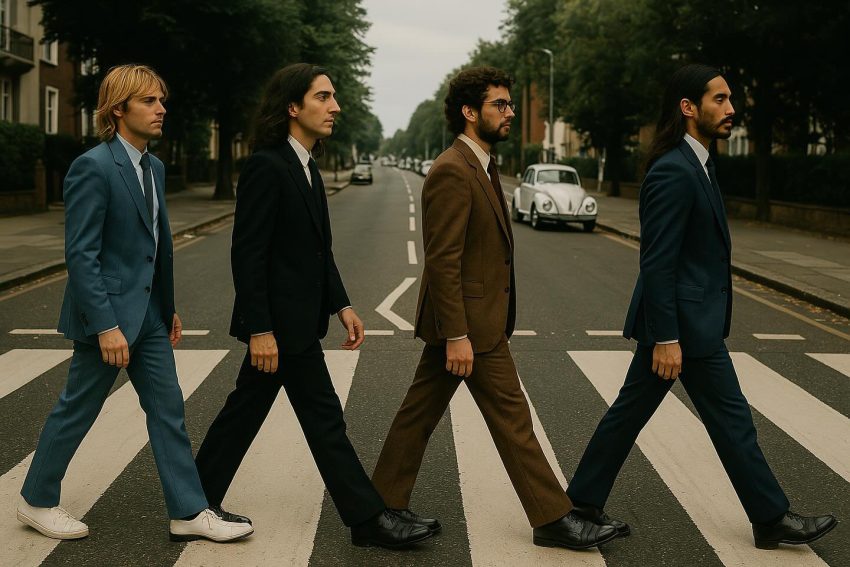The Rise of an AI-Generated Band on Spotify
A mysterious new band is making waves on Spotify, accumulating over a million listens in just a few weeks. Their name is The Velvet Sundown, and their music sounds familiar, with tracks that are easy to listen to but not quite the next big hit. What has sparked controversy is the fact that they are entirely AI-generated, and the streaming platform isn’t clearly informing listeners about this.
Who Are The Velvet Sundown?
When The Velvet Sundown first appeared on Spotify at the end of June, they had a ‘verified artist’ profile claiming the band was formed by singer and mellotron player Gabe Farrow, guitarist Lennie West, Milo Rains, who crafts the band’s textured synth sounds, and free-spirited percussionist Orion “Rio” Del Mar. However, some users quickly became suspicious because none of these individuals had any social media presence or evidence of existing outside of this bio. It raised questions about how a band could gain such popularity without any real-world promotion.
The AI Connection
The Velvet Sundown have now admitted that both the band members and the music are AI-generated. Before this revelation, Deezer, a rival music streaming service, had already tagged their music as AI-generated. This wasn’t based on images or promotional material but on an analysis of the music itself.
Aurelien Herault, Chief Innovation Officer at Deezer, explained that their detection tool uses datasets from generative models like Suno and Udio, allowing them to recognize signals and sounds in fully AI-generated music that aren’t present in authentic tracks. They’ve also made progress in identifying AI tracks without specific datasets. Thanks to this tool, Deezer is confident that the albums tagged as AI-generated are indeed created using artificial intelligence.
The Art Hoax
After speculation across news organizations, The Velvet Sundown finally admitted they were not real humans. Their Spotify profile now refers to them as a synthetic music project guided by human creative direction. However, their online presence is even more confusing, with multiple accounts claiming to be them on both X and Instagram.
An unofficial X profile posted many messages, including claims that the music was created with real instruments and real souls. Later, the account was unmasked as Andrew Frelon, who admitted to creating fake posts using ChatGPT and using a fake name. He claimed his intention was to explore disinformation and generative AI, seeing an opportunity for mischief as the newly buzzed-about ‘band’ had no social media presence.
The Prevalence of AI Music
AI-generated music is becoming increasingly common. Deezer reports that 20,000 fully AI-generated tracks are submitted every day, doubling from the start of the year. Mr. Herault stated that AI music now makes up approximately 18% of all tracks delivered to the platform. Deezer prioritizes revenues going to real artists by removing fully AI-generated tracks from algorithmic or editorial recommendations. They believe music fans have a right to know what they’re listening to, hence their transparent approach of tagging AI-generated music.
The Impact of AI on the Music Industry
As AI technology improves, we can expect more tracks that sound great and are made by AI. This trend is also influencing other areas, such as filmmaking and potentially even white-collar jobs. Spotify has been investing heavily in AI, offering features like playlist creation and AI-curated DJ experiences. However, it has faced accusations of adding AI-generated music to popular playlists without clear indication to users.
The Problem of Fraudulent Streams
One way scammers benefit from uploading AI music is by generating enough streams to earn royalties. There are even so-called ‘streaming farms’ where tracks are listened to repeatedly to game the system. A song could be made by AI and listened to by bots on repeat, with humans barely involved in the process. To avoid suspicion, fraudsters flood platforms with many fake songs, each streamed just a few thousand times—enough to make money but less likely to raise red flags.
Mr. Herault explained that if an artist gains a significant number of users streaming their music, they become entitled to a bigger share of the royalty pool. While this applies to any artist, AI music is easier to produce. He noted that up to 70% of streams of fully AI tracks are fraudulent, though AI tracks only make up 0.5% of overall streams. Deezer excludes these fraudulent streams from royalty payments.
Despite The Velvet Sundown’s admission on Spotify, there is still no general system to flag AI content to users. As AI continues to shape the music industry, transparency and clear labeling remain crucial for maintaining trust with listeners.
